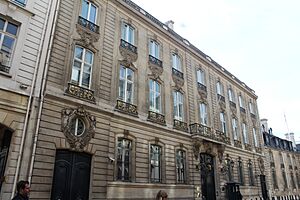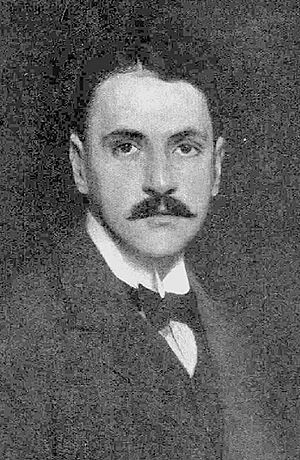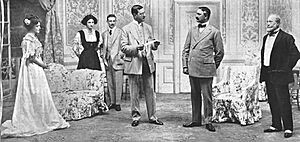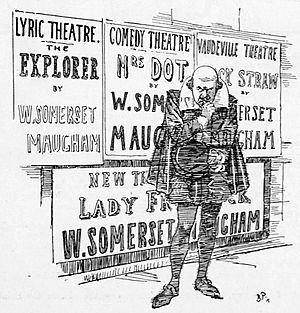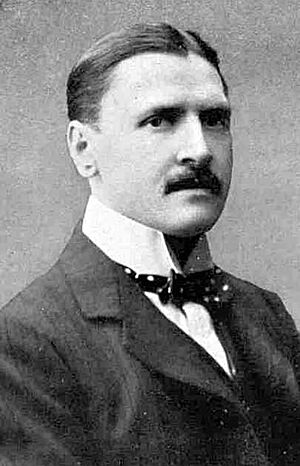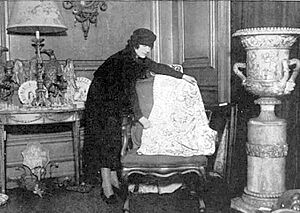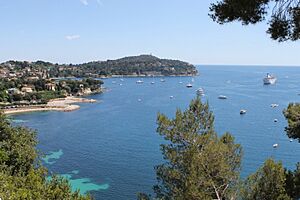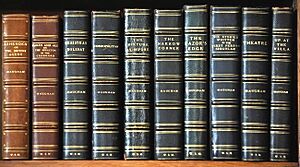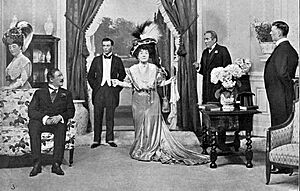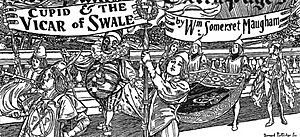W. Somerset Maugham facts for kids
Quick facts for kids
W. Somerset Maugham
|
|
|---|---|
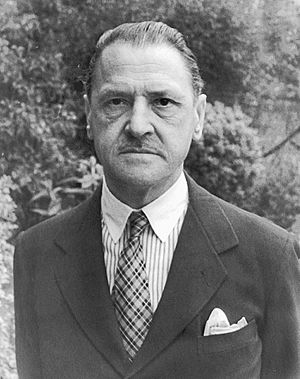
Maugham by Carl Van Vechten, 1934
|
|
| Born | William Somerset Maugham 25 January 1874 Paris, France |
| Died | 16 December 1965 (aged 91) Nice, Alpes-Maritimes, France |
| Occupation | Playwright, novelist, short-story writer |
| Education |
|
| Years active | 1897–1964 |
| Spouse |
Syrie Wellcome
(m. 1917; div. 1929) |
| Children | Mary Elizabeth (Liza) Wellcome |
William Somerset Maugham CH (pronounced MAWM; 25 January 1874 – 16 December 1965) was a famous English writer. He was well-known for his plays, novels, and short stories.
Maugham was born in Paris, France, and lived there for his first ten years. He then went to school in England and later studied at a German university. He also became a medical student in London and qualified as a doctor in 1897. However, he never worked as a doctor. Instead, he chose to become a full-time writer.
His first novel, Liza of Lambeth (1897), was about life in poor city areas. It caught people's attention. But Maugham first became famous as a playwright. By 1908, he had four plays showing at the same time in London's West End. He wrote his 32nd and last play in 1933. After that, he focused on writing novels and short stories.
Some of Maugham's well-known novels include Of Human Bondage (1915), The Moon and Sixpence (1919), The Painted Veil (1925), Cakes and Ale (1930), and The Razor's Edge (1944). His short stories were collected in books like The Casuarina Tree (1926) and The Mixture as Before (1940). Many of his stories were made into radio shows, movies, and TV shows.
Maugham was very popular, and his books sold a lot. Some critics didn't like this, saying he was just "competent." But today, Of Human Bondage, which has many parts of his own life, is seen as a masterpiece. His short stories are also highly praised. Maugham's writing style was clear and easy to understand.
During the First World War, Maugham worked for the British Secret Service. He later used these experiences in his stories published in the 1920s. He married Syrie Wellcome in 1917, and they had a daughter named Liza. The marriage lasted twelve years. Maugham traveled a lot, especially to Asia and the South Seas, gathering ideas for his stories. He lived in the French Riviera and enjoyed hosting guests. He stopped writing novels after the Second World War. He died at the age of 91.
Contents
Life and Early Career
Family Background and Childhood
William Somerset Maugham came from a family of lawyers. His grandfather, Robert Maugham, was a well-known lawyer. Maugham's father, Robert Ormond Maugham, was a successful lawyer in Paris. All of his children, including William, were born in France. His father handled legal matters for the British Embassy there.
Just before Maugham was born, France planned a law that would make all boys born in France to foreign parents French citizens. This meant they could be forced to join the military. To avoid this, the British ambassador set up a maternity ward inside his embassy, which was considered British land. William Somerset Maugham was born there on 25 January 1874. Maugham never liked his middle name and was known as "Willie" by his family and friends.
Maugham's mother died in January 1882, shortly after his eighth birthday. He later said her loss was "a wound that never entirely healed." He kept her photograph by his bed even when he was old. Two and a half years later, his father died. Maugham was then sent to England to live with his uncle, Henry MacDonald Maugham, a vicar in Whitstable, Kent.
After living in Paris for ten years, Maugham found life in Whitstable very different. He felt it was strict and narrow-minded. His uncle and aunt were kind but seemed distant compared to his loving home in Paris. He became shy and developed a stammer, which he had for the rest of his life. He also started to question his faith during this time and became a non-believer.
From 1885 to 1890, Maugham attended The King's School, Canterbury. He felt like an outsider there and was teased for his poor English (French was his first language), his short height, his stammer, and his dislike of sports. He left as soon as he could. Later in life, he grew to like the school and became a generous supporter.
Education and First Steps in Writing
A small inheritance from his father allowed Maugham to study at Heidelberg University in Germany. His German aunt helped him find a place to stay. At sixteen, he traveled to Germany. For a year and a half, he studied literature, philosophy, and German. While in Heidelberg, Maugham wrote his first book, a biography of a composer, but it was never published.
When Maugham returned to Britain in 1892, he and his uncle had to decide his future. He didn't want to go to Cambridge University like his brothers. His stammer meant he couldn't be a lawyer or a church minister. His uncle also ruled out the civil service. A family friend found Maugham a job at an accountant's office in London, but he quit after a month.
The local doctor in Whitstable suggested medicine. Maugham's uncle agreed. Maugham, who had been writing since he was 15, secretly planned to become an author. From 1892 until he qualified in 1897, he studied medicine at St Thomas's Hospital Medical School in Lambeth.
Becoming a Writer
Medical Training and First Novel
During his medical studies, Maugham met very poor working-class people. He said he saw "life in the raw." He learned a lot from these experiences: "I saw how men died. I saw how they bore pain. I saw what hope looked like, fear and relief."
Maugham rented rooms in Westminster, across the Thames River from the hospital. He filled many notebooks with ideas and kept writing every night while studying for his medical degree. In 1897, he published his first novel, Liza of Lambeth.
The book received mixed reviews. Some praised its vividness and strong characters, while others disliked its topic of slum life. However, the first printing sold out in three weeks. Maugham qualified as a doctor the month after Liza of Lambeth was published. He immediately left medicine to become a full-time writer, a career he loved.
Early Success as a Playwright
Before his next novel, The Making of a Saint (1898), Maugham traveled to Spain. He loved the Mediterranean countries. He settled in Seville, grew a mustache, and took guitar lessons.
The Making of a Saint was a historical novel and didn't get as much attention as Liza of Lambeth. Maugham kept writing. Within five years, he published two more novels and a collection of short stories, and his first play was produced. But he didn't have another big success until October 1907. His comedy Lady Frederick opened in London. He had written it four years earlier, but many theaters had turned it down. It ran for 422 performances. By the next year, Maugham had three other plays running in London at the same time.
Maugham later said he didn't make much money from this success, but it made him famous. The magazine Punch even printed a cartoon of Shakespeare's ghost looking worried about how many of Maugham's plays were showing. Between 1908 and 1914, Maugham wrote eight more plays. He also wrote the supernatural thriller The Magician (1908).
World Wars and Travels
First World War and Of Human Bondage
By 1914, Maugham was famous, with thirteen plays and eight novels finished. He was too old to join the army when the First World War started. Instead, he volunteered as an ambulance driver in France for the British Red Cross.
Before the war, Maugham had been finishing his novel Of Human Bondage. This book tells the story of a young man growing up and includes many parts of Maugham's own life. The main character, Philip Carey, experiences similar childhood problems as Maugham. He loses his mother, his family home breaks up, and he is raised by older relatives who are not very warm. Carey also has a club foot, which some people compare to Maugham's stammer.
Maugham proofread Of Human Bondage while on ambulance duty. When the book was published in 1915, some reviews were good, but many were not excited. However, the influential American novelist Theodore Dreiser praised it greatly, calling it a work of genius. After this, Maugham's popularity grew, and people eagerly bought his novels and short stories.
In 1915, Maugham's only child, Mary Elizabeth, known as Liza, was born.
Secret Service Work and Marriage
After his daughter's birth, Maugham moved to Switzerland. He spoke French and German well, which was helpful. For a year, he worked for the British Secret Service in Geneva. He was recruited by Sir John Wallinger, who appears as the spy master "R" in Maugham's later Ashenden stories. His wife, Syrie, and daughter, Liza, were with him for part of the year. This made it seem like he was just a normal family man, which was good cover for his secret work. Being a writer also allowed him to travel and stay in hotels without drawing attention. His secret job was to organize British agents in enemy areas and send their information to London.
In November 1916, the intelligence service asked Maugham to go to the South Seas. He was joined by Gerald Haxton, who had been his colleague as an ambulance driver. Haxton became his secretary and travel companion. Besides his spy work, Maugham collected ideas for his stories everywhere they went. He was good at observing people and places and using them in his fiction. Haxton, who was outgoing, helped Maugham connect with many different people.
After the South Seas trip, Maugham visited the US, where Syrie joined him. In May 1917, they married in New Jersey. Maugham felt it was his duty to marry. They soon began to grow apart. Syrie returned to England, and Maugham continued his secret agent work. He was sent to Russia to try and keep Russia in the war after the monarchy was overthrown. He arrived in Petrograd in August, but it was too late. In November, Lenin and the Bolsheviks took power and pulled Russia out of the war.
By then, Maugham was sick with tuberculosis. He returned to Britain and spent three months recovering in a sanatorium in Scotland. While there, he wrote a comedy called Home and Beauty. In the same year, Maugham published one of his most famous novels, The Moon and Sixpence. It was very well received by critics.
Travels and Divorce in the 1920s
When Maugham was in Britain, he lived with his wife in their house in Marylebone. But they were very different people, and their relationship became difficult. He spent a lot of time traveling. He and Haxton visited the Far East in 1919–20, keeping Maugham away from home for six months.
In late 1920, Maugham and Haxton went on a trip that lasted over a year. They visited Hollywood (which Maugham disliked but found profitable), San Francisco, Honolulu, Australia, Singapore, and the Malay Peninsula. Maugham always observed carefully and collected ideas for his stories. Another author, Cyril Connolly, said that a part of the world from Singapore to the Marquesas would always be known as "Maugham's world." In 1922–23, Maugham's next long trip was to south and east Asia, including stops in Colombo, Rangoon, Mandalay, Bangkok, and Hanoi.
While Maugham was away, his wife became a successful interior designer. Her focus on work briefly eased their home tensions when Maugham was there. After another long trip to the Far East, he and Syrie agreed to live separately. She would live in London, and he would live at Cap Ferrat in the south of France. They divorced in 1929.
During the 1920s, Maugham published one novel (The Painted Veil, 1925), three books of short stories, and a travel book. But he also wrote a lot for the theater. He wrote seven plays during this time. His longest-running play was Our Betters, which was performed 548 times in London in 1923.
Later Years and Final Works
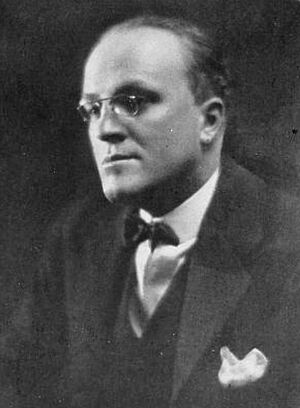
In 1930, Maugham published the novel Cakes and Ale. By the early 1930s, Maugham was tired of writing plays. He told Noël Coward in 1933 that he was "done with playwriting." He felt that writing novels gave him more freedom.
Maugham's thirty-second and last play was Sheppey (1933). It was different from his usual style and confused critics and the public. It only ran for 83 performances. Maugham later wrote that he realized he was no longer connected with the theater audience and decided it was time to retire from playwriting.
Maugham's days of long trips to distant places were mostly over. However, he sailed to the West Indies in 1936. During a visit to India in 1938, he became interested in Indian philosophers. He visited the Hindu sage Ramana Maharishi and later used him as a model for a spiritual teacher in his 1944 novel The Razor's Edge.
Throughout the 1930s, Maugham lived and entertained lavishly with Haxton at his house on Cap Ferrat, called the Villa La Mauresque. He had thirteen servants. When the Second World War started in 1939, he stayed as long as he could. But in June 1940, France surrendered. Knowing that the Nazis disliked him, Maugham traveled to England on a coal freighter. Haxton, being an American citizen, stayed at the villa to secure it before going to New York.
Second World War and Later Life
Maugham spent most of the war years in the US, staying at a comfortable house owned by his American publisher. He lived simply, feeling he shouldn't live luxuriously while Britain was suffering. He saw little of Haxton, who worked in Washington D.C. Maugham continued to write every day. His most important book from the war years was The Razor's Edge. He found writing it very tiring, as he was seventy when he finished it. He promised himself it would be his last long novel.
In November 1944, Haxton died of tuberculosis. Maugham was very sad. He told his nephew that Haxton was connected to the best years of his life and all he had written in the last twenty years.
Even before Haxton's death, Maugham had chosen a new secretary and companion, Alan Searle. Maugham had known Searle since 1928. Searle came from a poor area of London. People had different opinions about Searle, some seeing him as very kind and others as a troublemaker.
After the war, Maugham returned to the south of France. Before that, he stayed in London until the end of 1946. While there, he created the Somerset Maugham Award. This award is given each year to a British writer under thirty-five for fiction, non-fiction, or poetry. After returning to Cap Ferrat, he finished his last full-length novel, Catalina. He also helped adapt some of his short stories into films, like Quartet (1948), Trio (1950), and Encore (1951). He appeared in these films, giving introductions. He did the same for the American TV series Somerset Maugham Theater, which was very popular.
Maugham often visited London. In 1954, he was made a Companion of Honour (CH) by the Queen at Buckingham Palace. This is a special award for great achievements. He was understood to have turned down a knighthood, wanting an even more exclusive honor.
In his later years, Maugham followed a regular routine. He spent winter and spring at his home, traveled a few weeks, and had a busy social summer. He then spent autumn in London. In 1959, he took a final trip to the Far East. He tried to stay healthy, but his final years were affected by health issues and legal problems. He tried to disinherit his daughter and adopt Searle, but the courts stopped him.
Maugham died in Nice on 16 December 1965, at the age of 91, after a fall. He was cremated in Marseille. Two days later, his ashes were buried at The King's School, Canterbury, next to the library he had supported. This was a fitting place for a great storyteller.
Maugham's Works
Plays
Maugham's biggest theater success was an adaptation of his short story "Rain," which opened in New York in 1921 and ran for 648 performances. Most of his original plays were comedies. But his serious dramas like East of Suez (1922), The Letter (1927), and The Sacred Flame (1929) also ran for more than 200 performances. His longest-running comedies included Lady Frederick (1907), Jack Straw (1908), Our Betters (1923), and The Constant Wife (1926).
Maugham's plays had sharp humor and fun situations. His characters were often from the same social class as his audience. His dialogue was natural and easy to speak. He believed that words had "weight, sound, and appearance."
Unlike some other playwrights, Maugham didn't write plays to teach lessons. He wrote them to entertain. He was seen by some as a pessimist, meaning he didn't believe art could greatly improve humanity. Like Chekhov, Maugham was also a doctor. This medical training gave them a realistic view of human nature.
A few of Maugham's plays have been performed again since his death. These include The Constant Wife and The Circle.
Novels
Maugham published nineteen novels from the 1890s to the 1940s. The most famous ones are Liza of Lambeth, Of Human Bondage, Cakes and Ale, The Moon and Sixpence, and The Razor's Edge.
Liza of Lambeth shocked some people because it showed the harsh reality of life in London's poor areas. It had a sad ending.
Of Human Bondage is a serious, partly autobiographical novel. It shows a young man's struggles and emotions. The hero survives and seems headed for a happy ending.
Cakes and Ale mixes funny satire about the London literary world with observations about love. It has a strong female character, Rosie, who is very different from the difficult Mildred in Of Human Bondage. Maugham said that while Of Human Bondage was his best work, Cakes and Ale was his favorite to write.
The Moon and Sixpence tells the story of a man who leaves his normal life and family to become a painter. The book is unusual because the main character is already dead when the story begins. The narrator tries to piece together his life, especially his last years in Tahiti. The Razor's Edge, Maugham's last major novel, explores how to find meaning in life by looking at Eastern spiritual ideas.
Short Stories
Many readers and critics believe Maugham's best writing is in his short stories. He was known as a master of this form in English. Most of his stories were first published in magazines and then collected into books. His first collection, Orientations, came out in 1898, and his last, Creatures of Circumstance, in 1947.
His stories range from short sketches, like those in On a Chinese Screen (written during his travels in China and Hong Kong), to longer, more serious stories. Many of these deal with the lives of British people living in the Pacific Islands and Asia. These stories often show the emotional challenges of being isolated far from home.
Among his short stories set in England, "The Alien Corn" (1931) is well-known. It's about a young man who reconnects with his Jewish background. Another English story is "Lord Mountdrago" (1939), about a politician's mental breakdown.
The character William Ashenden appears in a collection of spy stories (1928). Ashenden is a writer who is recruited into the British Secret Service, just like Maugham was. These stories are based so closely on Maugham's real experiences that they were not allowed to be published until ten years after the war ended. Ashenden later appeared as the narrator in Cakes and Ale.
Maugham also wrote funny stories. "Jane" (1923) is about a quiet widow who becomes a wild socialite. "The Creative Impulse" (1926) tells of a bossy writer whose mild husband leaves her for their cook. "The Three Fat Women of Antibes" (1933) is about three friends who play competitive bridge while trying to lose weight.
Adaptations of His Works
Maugham's works have been made into many films, radio shows, and television plays. One newspaper commented in 1964 that British TV and radio would struggle without Maugham's stories. His novels like Of Human Bondage, The Moon and Sixpence, The Painted Veil, and The Razor's Edge were all made into movies.
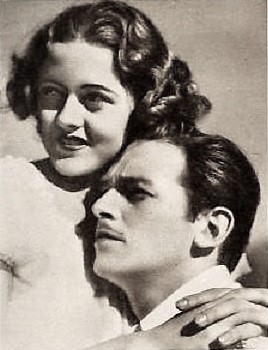
One study noted that Maugham's works had been made into forty films and hundreds of radio and TV plays. This means his work has been adapted more than almost any other serious writer. His ability to tell a fascinating story and his dramatic skills appealed to filmmakers and radio producers. However, sometimes adapters changed his stories to be less daring and more "moralistic."
Radio and television adaptations have generally been more faithful to Maugham's original stories. The BBC (British Broadcasting Corporation) has a long history of adapting his plays, novels, and short stories for radio.
Awards and Reputation
Honors and Recognition
Maugham received several important honors. He was made a Companion of Honour in 1954, on the advice of Prime Minister Winston Churchill. Six years later, he was one of the first five writers to be made a Companion of Literature. He was also a Commandeur of the Legion of Honour (a French award) and received honorary doctorates from the universities of Oxford and Toulouse.
On his eightieth birthday, the Garrick Club held a special dinner in his honor. Only a few other famous writers like Dickens had been honored in this way. He was also a member of the Royal Society of Literature and the American Academy of Arts and Letters.
His Place in Literature
Some critics say that Maugham's standing in literature has remained low, even though he influenced many well-known writers. He sold more books and lived longer than writers like James Joyce and Virginia Woolf. However, he wasn't known for new writing styles or complex themes like they were. Still, Maugham is recognized as an influence on writers such as Noël Coward, Graham Greene, and George Orwell. His spy character, Ashenden, influenced later spy fiction writers like Ian Fleming (who created James Bond) and John le Carré.
Maugham himself was modest about his writing. He said he had "no illusions about my literary position." He felt that critics didn't take him seriously, but he didn't resent it. Critics often said his writing lacked deep emotion.
However, some important critics did praise him, especially for his short stories. They noted his clear and precise writing style. While some felt his writing was too "polished" and lacked sudden moments of great passion, Maugham believed he wrote about what he saw. He said that while he could see more than most people, "the greatest writers can see through a brick wall – my vision is not so penetrating."
On his eightieth birthday, The New York Times commented that Maugham had outlived many of his famous contemporaries. They said he was now seen as being as excellent as them, even though his popularity had caused critics to underestimate his work. They called Of Human Bondage a masterpiece and believed some of his short stories would "prove immortal." Many people today still consider Of Human Bondage to be his best work and a classic English novel.
See also
 In Spanish: W. Somerset Maugham para niños
In Spanish: W. Somerset Maugham para niños
 | Frances Mary Albrier |
 | Whitney Young |
 | Muhammad Ali |


